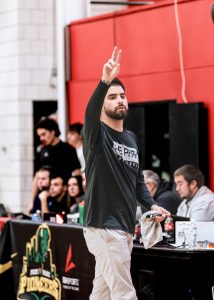Professor stuck in Spain due to COVID-19
April 17, 2020
In the dark evening of Mar. 9, 2020, Dr. Helena Knorr, Ph.D., was supposed to finally arrive back to her Wilkinsburg home after two-and-a-half weeks away in Spain.
Knorr, a professor of organizational leadership at both the Rowland School of Business and the Department of Literary Arts and Social Justice at Point Park, arrived in the Basque Country of Northern Spain on Feb. 21 to present academic research at the University of Deusto in Bilbao.
Knorr had planned to finally end her trip abroad and resume her personal and academic life here in Pennsylvania after 17 days of lecturing and seeing family in Spain in one long, protracted day of crossing the Atlantic from Bilbao to Pittsburgh with stopovers in Dublin, Ireland and Chicago.
However, when a global pandemic occurs, almost nothing goes according to plan.
On Mar. 6, three days before Knorr was scheduled to come back to the United States, Knorr discovered that she had a fever. After consulting with a physician whom she told about her March 9 flight to Pittsburgh, with the doctor’s advice, Knorr decided against flying stateside and has since been quarantined in Vitoria-Gastiez, Spain, 3,480 miles away from Wilkinsburg.
“The fever was unexpected but I have been following and anticipating the spread of COVID-19 since January,” Knorr said of her reaction to becoming stuck in Spain. “I was lecturing students and making them think about human resources during times of crisis in relation to this virus back in January.”
Now, a trip that was only intended to last under three weeks has eclipsed over seven weeks in length and may extend for a few more months.
Knorr is not alone in being stuck thousands of miles away from where she lives during the COVID-19 pandemic. Thousands of others from around the world currently find themselves stranded abroad due to travel complications related to the novel coronavirus pandemic and are currently in efforts to lobby their governments to help repatriate them back — including 13,500 stranded American citizens and legal residents who have asked the State
Department for help getting them back to the United States, according to the New York Times.
In contrast to the disquieting state of affairs of thousands of other stranded travelers the world over, Knorr’s condition in Spain is a little more comfortable.
“I’m home with my family,” Knorr said about the possibility of staying in Vitoria-Gastiez for a few more months. “I’ll be fine.”
Despite the six-hour time difference of being quarantined an ocean’s length away, Knorr still teaches her courses at Point Park online. Knorr has also spent time doing consulting work with three different Spanish businesses to help them transfer their services online. She also continues to do virtual consulting work with business owners in Mexico during her quarantine.
In addition to preparing and instructing her online classes and doing consulting work at odd hours throughout the day, Knorr has also given some of her time to speak about her life in Spain and the state of the pandemic there to students in other Point Park classes.
“It was very eye-opening to hear her talk about her situation over there,” Keera Frye, a senior broadcast reporting major, said of Knorr’s recent lecture to her International Media class. “Listening to her talk about her personal experience of being stuck in Spain made it more real than just numbers.”
When she isn’t working or lecturing from home, Knorr — who hasn’t left her quarantine in over a month other than to get groceries and take out the trash — spends time doing other activities that she enjoys such as sunbathing through an open window in the house and practicing yoga.
Knorr’s circumstance in Spain raises concerns over how Point Park would be able to respond in the event that another faculty member or student were to be stranded abroad, according to Archish Maharaja, professor of Business and director of Graduate Programs at the Rowland School of Business.
“In Dr. Knorr’s situation, she is home,” Maharaja said “That is one consolation for us that she is home and can be taken care of. But if it was a student or anybody else it would be very concerning to all of us here and it raises the question: How would we help that person out?”
According to Knorr, the most important thing to take away from her current situation in Spain is: “Be humble and don’t take anything in life for granted.”


















